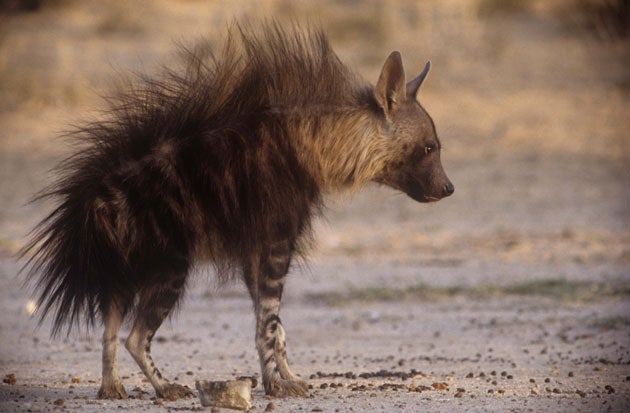Hyenas use a 'laughing language' to communicate
New research has shown that hyena laughter encodes complex information about age, status and identity

Your support helps us to tell the story
From reproductive rights to climate change to Big Tech, The Independent is on the ground when the story is developing. Whether it's investigating the financials of Elon Musk's pro-Trump PAC or producing our latest documentary, 'The A Word', which shines a light on the American women fighting for reproductive rights, we know how important it is to parse out the facts from the messaging.
At such a critical moment in US history, we need reporters on the ground. Your donation allows us to keep sending journalists to speak to both sides of the story.
The Independent is trusted by Americans across the entire political spectrum. And unlike many other quality news outlets, we choose not to lock Americans out of our reporting and analysis with paywalls. We believe quality journalism should be available to everyone, paid for by those who can afford it.
Your support makes all the difference.Hyenas use a "laughing language" to communicate with each other, scientists have learned.
The animals are famous for their manic giggling, especially around a kill.
But although they might appear to treat the business of survival as a joke, the laughing sounds have a serious purpose.
New research has shown that hyena laughter encodes complex information about age, status and identity.
It may also signal a call for help and co-operation in food contests.
Study leader Dr Frederic Theunissen, from the University of California at Berkeley, said: "The hyena's laugh gives receivers cues to assess the social rank of the emitting individual.
"This may allow hyenas to establish feeding rights and organise their food-gathering activities."
The US and French scientists recorded the calls of 26 captive hyenas at a field station operated by the University of California.
They found that variations in the giggles' pitch and timbre helped the animals establish social hierarchies.
Laughter pitch indicated a hyena's age, while differences in the frequency of notes encoded information about dominant and submissive status.
Giggles carried a "broad range of messages" that were informative enough to play a role in social interactions, the scientists reported in the journal BMC Ecology.
They pointed out that hyenas were highly intelligent animals capable of understanding complex relationships.
"Their substantial vocal repertoire should play a very important role, by providing eavesdroppers with a number of important clues about the emitters' identity and characteristics," the researchers wrote.
Dr Theunissen said giggles may also convey a message of "frustration" and a request for help when competing with other predators such as lions.
"Lions often eat prey previously killed by hyenas," he said. "A solitary hyena has no chance when confronted by a lion, whereas a hyena group often can 'mob' one or two lions and get their food back. Giggles could therefore allow the recruitment of allies.
"Co-operation and competition are everyday components of a hyena's life. When hearing a giggling individual, clan-mate hyenas could receive information about who is getting frustrated (in terms of individual identity, age, status) and decide to join the giggler, or conversely to ignore it or move away."
The team plans to carry out further similar research while observing hyenas in the wild.
Hyenas are Africa's most common large carnivore and one species is also found in Asia.
Contrary to popular belief, they are efficient hunters as well as scavengers, and are not members of the dog family. Hyenas are more closely related to mongooses and meerkats than dogs or cats.
Join our commenting forum
Join thought-provoking conversations, follow other Independent readers and see their replies
Comments